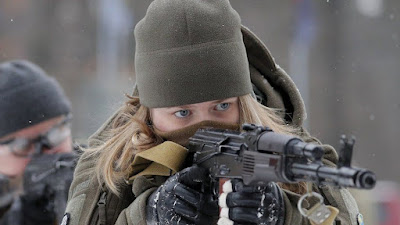Eliot Cohen "Why Can't We Admit Ukraine is Winning?"
Writing in The Atlantic, professor and author, Eliot Cohen, argues that we're selling the Ukrainians short in their battles with invading Russian forces.
The West’s biggest obstacle to accepting success, though, is that we have become accustomed over the past 20 years to think of our side as being stymied, ineffective, or incompetent. It is time to get beyond that, and consider the facts that we can see.
The evidence that Ukraine is winning this war is abundant, if one only looks closely at the available data. The absence of Russian progress on the front lines is just half the picture, obscured though it is by maps showing big red blobs, which reflect not what the Russians control but the areas through which they have driven. The failure of almost all of Russia’s airborne assaults, its inability to destroy the Ukrainian air force and air-defense system, and the weeks-long paralysis of the 40-mile supply column north of Kyiv are suggestive. Russian losses are staggering—between 7,000 and 14,000 soldiers dead, depending on your source, which implies (using a low-end rule of thumb about the ratios of such things) a minimum of nearly 30,000 taken off the battlefield by wounds, capture, or disappearance. Such a total would represent at least 15 percent of the entire invading force, enough to render most units combat ineffective. And there is no reason to think that the rate of loss is abating—in fact, Western intelligence agencies are briefing unsustainable Russian casualty rates of a thousand a day.
Add to this the repeated tactical blundering visible on videos even to amateurs: vehicles bunched up on roads, no infantry covering the flanks, no closely coordinated artillery fire, no overhead support from helicopters, and panicky reactions to ambushes. The 1-to-1 ratio of vehicles destroyed to those captured or abandoned bespeaks an army that is unwilling to fight. Russia’s inability to concentrate its forces on one or two axes of attack, or to take a major city, is striking. So, too, are its massive problems in logistics and maintenance, carefully analyzed by technically qualified observers.
The Russian army has committed well more than half its combat forces to the fight. Behind those forces stands very little. Russian reserves have no training to speak of (unlike the U.S. National Guard or Israeli or Finnish reservists), and Putin has vowed that the next wave of conscripts will not be sent over, although he is unlikely to abide by that promise. The swaggering Chechen auxiliaries have been hit badly, and in any case are not used to, or available for, combined-arms operations. Domestic discontent has been suppressed, but bubbles up as brave individuals protest and hundreds of thousands of tech-savvy young people flee.
Most professional scholars of the Russian military first predicted a quick and decisive Russian victory; then argued that the Russians would pause, learn from their mistakes, and regroup; then concluded that the Russians would actually have performed much better if they had followed their doctrine; and now tend to mutter that everything can change, that the war is not over, and that the weight of numbers still favors Russia. Their analytic failure will be only one of the elements of this war worth studying in the future.
At the same time, there are few analysts of the Ukrainian military—a rather more esoteric specialty—and thus the West has tended to ignore the progress Ukraine has made since 2014, thanks to hard-won experience and extensive training by the United States, Great Britain, and Canada. The Ukrainian military has proved not only motivated and well led but also tactically skilled, integrating light infantry with anti-tank weapons, drones, and artillery fire to repeatedly defeat much larger Russian military formations. The Ukrainians are not merely defending their strong points in urban areas but maneuvering from and between them, following the Clausewitzian dictum that the best defense is a shield of well-directed blows.


Sorting out the winners and losers is best left until the fog of war clears.
ReplyDeleteIn the meantime, far away from the battle, defense contractors and fossil fuels producers are winning big.
Same old, same old, NPoV. In the wild, vultures have to scavenge to live. Among humans, our vultures rise to the top.
ReplyDeletehttps://imgflip.com/i/303koj
DeleteDid we just define predatory disaster capitalism
while exposing the true nature of this conflict?
Great image, Lungta. Thanks.
DeleteDid we just define predatory disaster capitalism?
ReplyDeletehttps://fortune.com/2022/02/24/reddit-wallstreetbets-russia-ukraine/
https://www.inquirer.com/business/russia-wall-street-buys-bonds-goldman-20220307.html#:~:text=Finding%20ways%20to%20wager%20on,of%20Ukraine%20brings%20unique%20risks.
As with the 'freedom rally" it's all bollacks.
TB
I think the major reason to not concede that Ukraine is winning is that it seems pretty clear that it is not. Does the author not realise that that convoy parked not too far from Kyiv is the best evidence that Ukraine is in deep trouble? No missile attacks, no aircraft/helicopter attacks, not even some raids by infantry with MANPADS. It is the Russians and the Donbass militias that are besieging the Ukrainians in Mariupol , not the other way around.
ReplyDeleteauthor not realise that that convoy parked !!
ReplyDeleteThat says a lot of the situation.
Add that the Russians supply line took a huge hit today.
It's not over until it's over..
TB